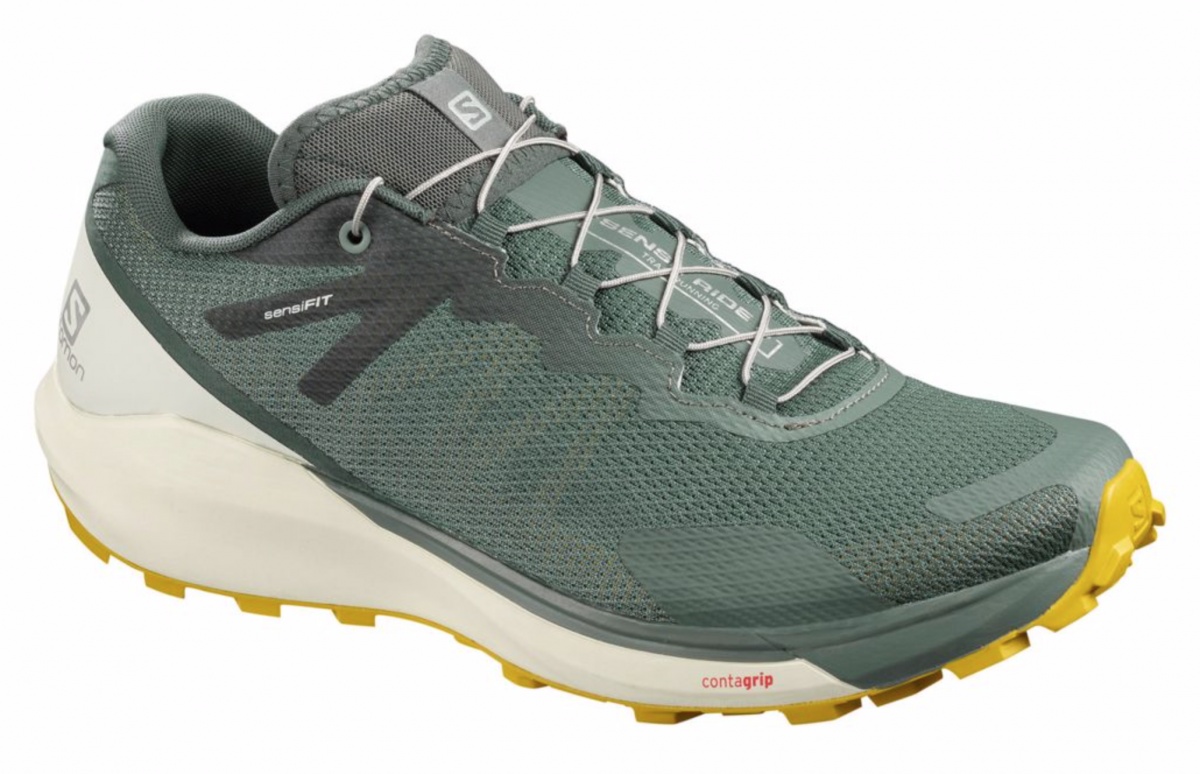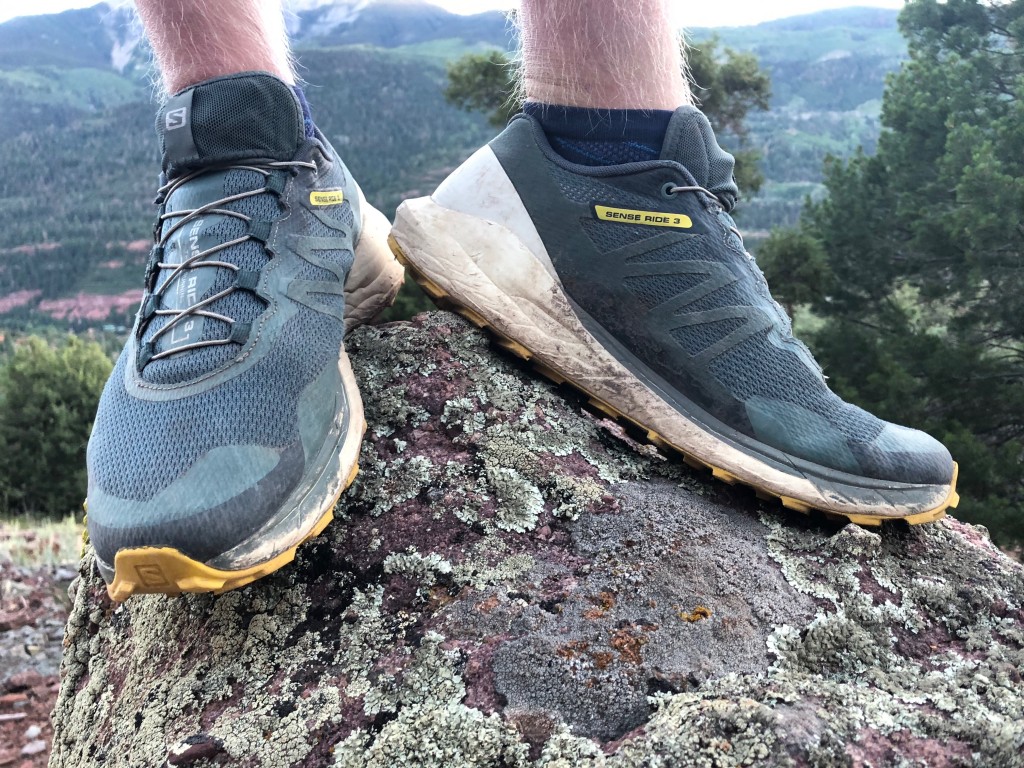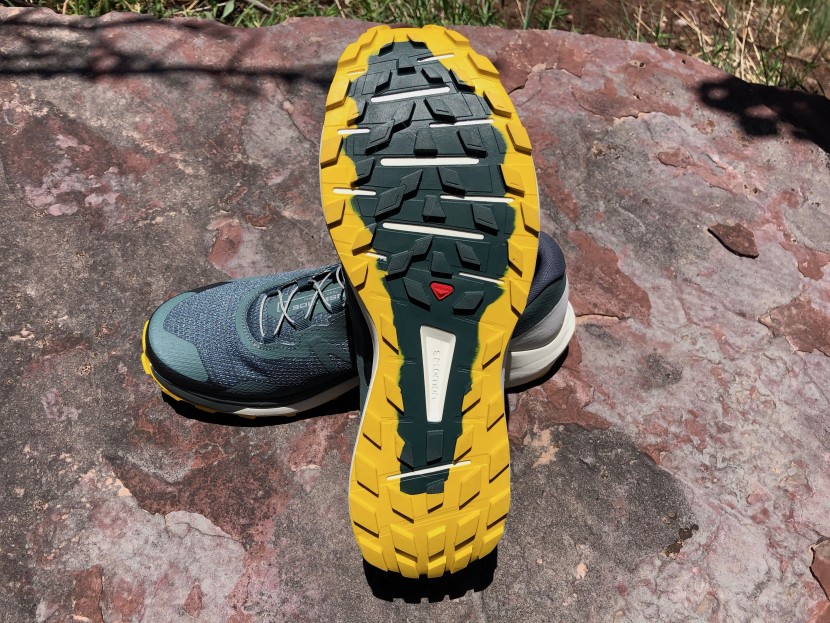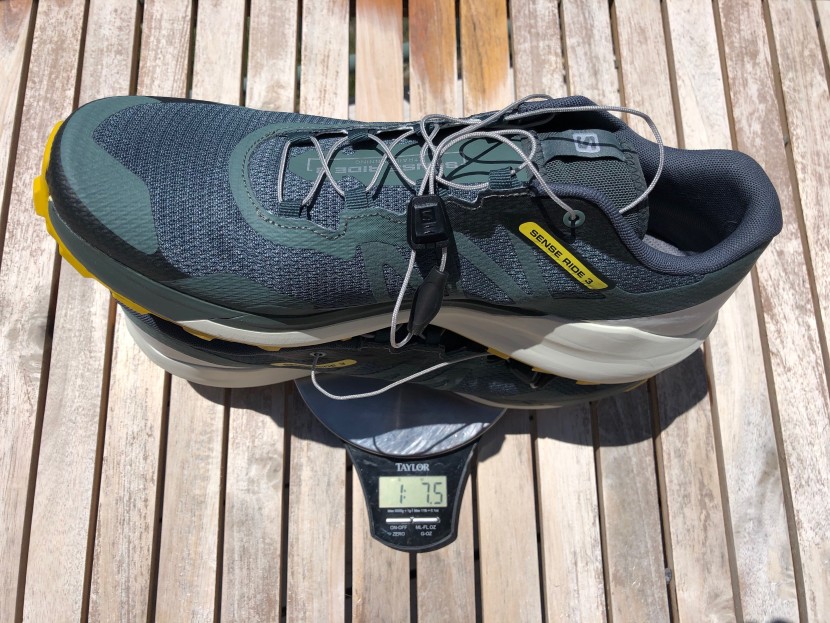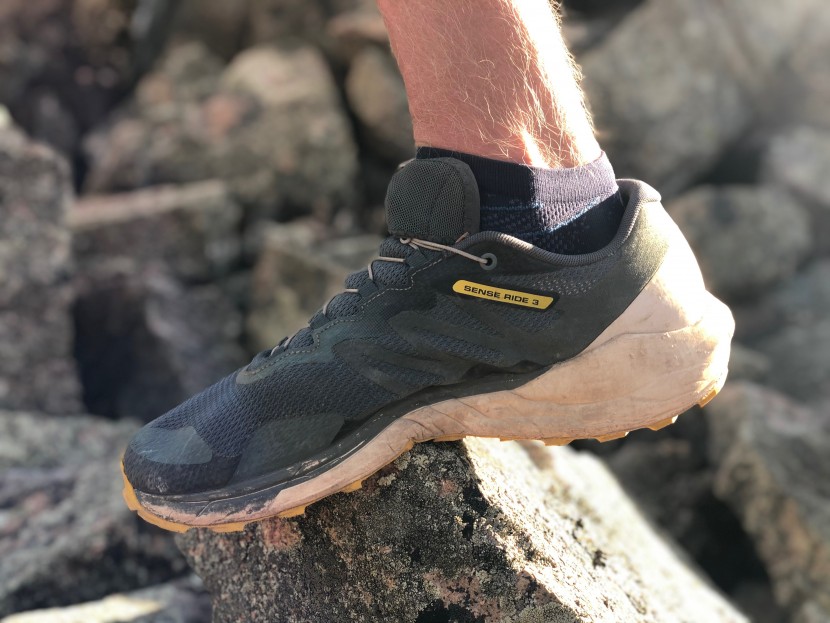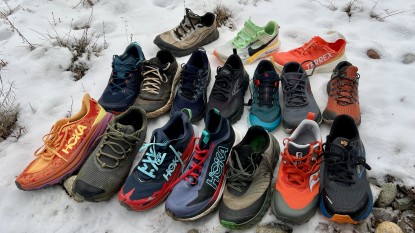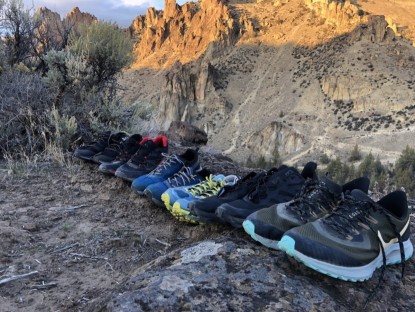Salomon Sense Ride 3 Review
Our Verdict
Our Analysis and Test Results
Salomon says that the Sense Ride 3 is built to “road running standards,” and as far as we can tell they mean that the shoe is made with extra cushioning. This is especially true under the heel, as the large heel counter is immediately noticeable. While this feature means that there is extra plush shock absorption under the heel, which we admittedly love, it also means that the shoe can be a bit unstable, especially when taken on off-trail terrain. The mesh upper is flexible and fairly wide, and breathes fairly well, especially compared to the other heavier, thicker, and more burly Salomon trail running shoes we have tested and reviewed recently. Like most of their offerings, this one comes with a Quicklace system that uses a plastic buckle to cinch up the string laces and hold them tight with no tying required. This buckle and the extra tab of lace tuck into the lace garage that lives on the upper outside of the tongue and stays neatly out of the way. Unfortunately, these shoes do not currently come in a wide version. The combination of a comfortable fit and plush cushioning makes them an ideal choice for logging mega miles, and we tested them on a couple of different marathon and ultra-distance training runs, finding our feet still feeling fresh after 35-mile wilderness runs.
Foot Protection
These shoes provide adequate foot protection, although are nowhere near as burly as some of the armored tanks you can also find. There is no rock plate underfoot to absorb the impacts of especially sharp objects, although the thick compressed EVA foam significantly dampens the effect of running on tough terrain, to the point where we never felt the need to moderate our speed due what was underfoot. Like most Salomon trail runners, they have a pretty high heel counter with a fairly thin foam-cushioned forefoot, so that there is an interesting combination of sensitivity and underfoot protection.
In terms of the upper, these are designed more to be light and breathable, rather than highly protective. They lack the heavy rubber wings or coatings that other Salomon trail runners do, but this also makes them feel more flexible. The mesh upper has minimal TPU film overlays that do a little to protect the integrity of the upper itself, but not a lot to protect the sides and tops of your feet. Likewise, the toe bumper is an extra thick rubberized TPU overlay, but is not very rigid for absorbing direct kicks.
Traction
We will admit to being pleasantly surprised by the traction of this shoe. It uses Salomon's Contagrip rubber throughout the entire outsole, with lots of diamond-shaped lugs that are 4mm deep. The lugs are spaced far enough apart to provide plenty of adequate grip on soft surfaces like snow and mud, despite the fact that they aren't as impressively aggressive as some other Salomon shoes.
Shorter lugs are a bit better for longevity, however, especially when running on harder surfaces like dirt roads or even asphalt. As a crossover designed shoe, it is necessary that the rubber isn't too soft, so it doesn't simply wear off after a few road runs, which certainly could happen with softer rubber rands. What we are especially impressed by is the stickiness of the Contagrip, and we found that it grips on rock just as well as La Sportiva's FriXion rubber, while it is far more grippy than the rubber that Nike uses.
Stability
As we've already mentioned, this is not the most stable shoe. This is due largely to the fact that the heel counter is significantly raised over the height of the forefoot. The heel-toe drop is a not too out of line 8mm, but for some reason, in this shoe it feels like a bit more. The 27mm of stack height under the heel is right up there near the top end of the spectrum, only a few millimeters lower than the super thick Hoka shoes.
When out on long trail runs, we noticed the propensity to roll over on narrow, technical trails, especially those that are water grooved in the middle such that the foot is always landing on a side-hill. This took some extra care to place our feet precisely and stay in balance, to the point where we would slow down to do so on occasion. Despite this issue, we found the landing platform to be firm and stable, and the Quicklaced upper to effectively hold the foot in place with little to no movement or slop.
Comfort
These shoes fit true to size, with good length in the toe box, combined with an adequately wide forefoot fit. While nobody is going to call them wide, the fact is that Salomon has long been known for making some of the narrowest shoes around, and these are a refreshing contrast. Those with especially wide feet should still expect problems, but those with average to narrow feet should find the fit to be just as expected. There is no wide version currently available.
We found this shoe to be very comfortable, even right out of the box. The construction is top quality, with a thin mesh upper in combination with an elastic inner sleeve that holds the foot in place and is connected to the tongue. We were able to run long distances in this shoe with very little repercussions and found that they also drained water adequately after tromping through streams mid-journey.
Weight
These shoes weigh in at 23.5 ounces per pair for a size men's US 11 (on our scale), which is about 1.5 ounces lighter than the heaviest options we've featured in this review. On the other hand, they are still considerably heavier than the lightest choices you could choose.
While Salomon's high-end professional level shoes are indeed very light and minimal, in our experience their more common, “everybody” type shoes are typically fairly heavy, featuring thick, burly uppers at the expense of weight. These shoes are a bit refreshing, therefore, simply for the fact that they employ foam in combination with a lightweight upper, and while they won't be confused for racing flats, they also aren't as clunky as many heavy competitors.
Sensitivity
The Sense Ride 3 effectively balance sensitivity with underfoot protection, managing to incorporate elements that should please people who appreciate both. While the heel is indeed a thick piece of foam that absorbs most impact, the fact is that through the arch and forefoot the foam is nowhere close to as thick, and does allow one to feel the terrain that they are stepping on. Depending on your particular running stride, of course, this can allow a nice amount of sensitivity and responsiveness on uphill terrain when pushing off with the forefoot, while also allowing you to fully heel-strike bomb down huge hills with some level of impunity.
We appreciate this balance of two very important and also diametrically opposed characteristics. We should also point out that like most EVA shoes, with more miles the foam breaks down a bit, becoming softer, less absorptive, and a bit more sensitive.
Value
While no trail running shoes these days would ever be described using the words “cheap” or “inexpensive,” the fact is that these ones are nowhere near the top end of the spectrum. As a regular trainer or long-distance champion shoe, we have found them to have lots of life in them, and at an average to slightly below average price, present a pretty solid value.
Conclusion
The Salomon Sense Ride 3 are among our favorite shoes for running on any types of terrain, enough so that we chose to recognize them as one of the best crossover shoes. If you commonly mix terrain styles and running surfaces, and also like a shoe that will allow you to keep hammering out those miles, we think this is an excellent choice for you.


